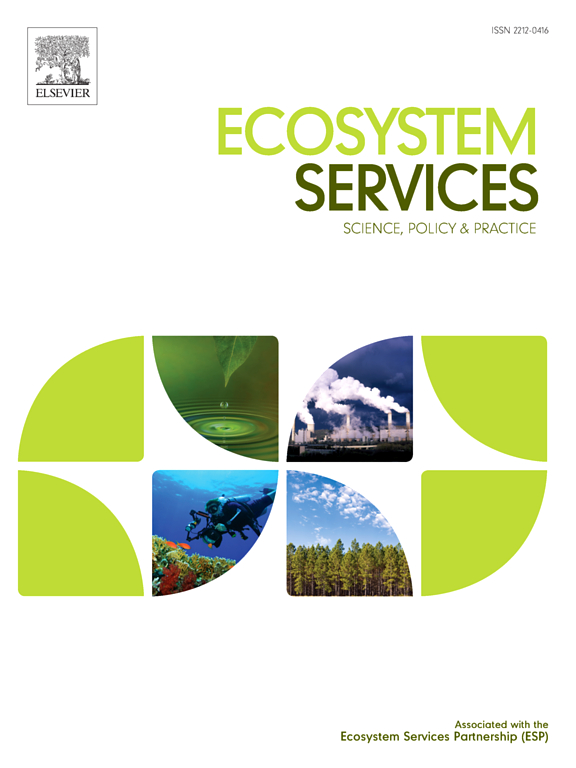Neighbour perspectives on cultural ecosystem services of blue-green infrastructures: The ecovillage Hannover, Germany
IF 6.6
2区 环境科学与生态学
Q1 ECOLOGY
引用次数: 0
Abstract
Urban projects based on Blue-Green Infrastructure (BGI) are increasingly developed through participatory and bottom-up processes aiming for a more just and equal supply of Cultural Ecosystem Services (CES). However, the concept of CES is shaped by underlying assumptions about valuation, governance structures, and power dynamics, which can lead to unequal access to and control over ES benefits. Furthermore, CES are often evaluated post BGI’s construction, focusing on distributive justice with limited scope for adjustments. This article investigates how pre-construction bottom-up processes shape the distribution and recognition of CES among communities and individuals. Using an Environmental Justice lens, it examines CES through three dimensions of justice simultaneously, namely distributional, recognition and procedural. This is tested for the case study of Ecovillage Hannover, an ecological housing project in Germany, developed through a bottom-up approach. After using qualitative and quantitative methods, the findings reveal that i.) the co-productive nature of CES influences their unequal distribution ii.) embracing trade-offs through discussions and confrontations is essential to address conflicting CES values; iii.) integrating quantitative and qualitative approaches supports a more holistic and just application of the CES framework. The study offers insights for public policies on the role of BGI in community-led housing projects, demonstrating how CES perceptions and justice considerations can guide more inclusive and sustainable outcomes, especially during early development stages.
蓝绿色基础设施文化生态系统服务的邻居视角:德国汉诺威生态村
基于蓝绿基础设施(BGI)的城市项目越来越多地通过参与式和自下而上的过程来发展,旨在提供更公正、更平等的文化生态系统服务(CES)。然而,消费电子产品的概念是由关于估值、治理结构和权力动态的潜在假设塑造的,这可能导致对消费电子产品利益的不平等获取和控制。此外,在华大基因构建之后,通常对CES进行评估,侧重于分配正义,调整范围有限。本文研究了施工前自下而上的过程如何塑造社区和个人对CES的分布和认可。使用环境正义的镜头,它通过正义的三个维度,即分配,承认和程序同时检查消费电子学。这在德国汉诺威生态村的案例研究中得到了验证,这是一个通过自下而上的方法开发的生态住房项目。在使用定性和定量方法后,研究结果表明:(1)消费电子产品的共同生产性质影响其不平等分配;(2)通过讨论和对抗进行权衡对于解决消费电子产品价值冲突至关重要;(三)将定量和定性方法结合起来,有助于更全面、更公正地应用社会经济合作框架。该研究为公共政策提供了关于华大基因在社区主导的住房项目中的作用的见解,展示了CES观念和正义考虑如何指导更具包容性和可持续性的结果,特别是在早期发展阶段。
本文章由计算机程序翻译,如有差异,请以英文原文为准。
求助全文
约1分钟内获得全文
求助全文
来源期刊

Ecosystem Services
ECOLOGYENVIRONMENTAL SCIENCES&-ENVIRONMENTAL SCIENCES
CiteScore
14.90
自引率
7.90%
发文量
109
期刊介绍:
Ecosystem Services is an international, interdisciplinary journal that is associated with the Ecosystem Services Partnership (ESP). The journal is dedicated to exploring the science, policy, and practice related to ecosystem services, which are the various ways in which ecosystems contribute to human well-being, both directly and indirectly.
Ecosystem Services contributes to the broader goal of ensuring that the benefits of ecosystems are recognized, valued, and sustainably managed for the well-being of current and future generations. The journal serves as a platform for scholars, practitioners, policymakers, and other stakeholders to share their findings and insights, fostering collaboration and innovation in the field of ecosystem services.
 求助内容:
求助内容: 应助结果提醒方式:
应助结果提醒方式:


